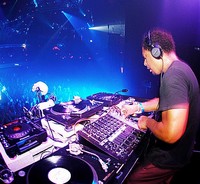Derrick May interview: Godfather of Techno
Author: Campbell Cooper
Thursday, May 25, 2006

In Australia, as well as all around the world, a lot of misconception exists around the term 'techno'. Those who refer to it in its true sense are in the minority; it is often confused with trance, or used as a generic reference to all electronic music. Does this trouble you-
Yeah, of course it does. It makes the purpose all the more purposeful: to continue to strive and push towards trying to show people what electronic music from Detroit is and what the origins are. It's not about trying to insult or degrade people's taste or likes or dislikes or change their likes or dislikes, it's more about making sure they know all the options. I don't think most people do. I don't think most people even realise that there were options to begin with. I often say I'm trying to 'save the world from bad music', but who's to determine what's bad music-
What is techno-
I wonder myself man. The word 'techno' was something that Juan Atkins thought out aloud. He maybe shouldn't have, but he did. Back then, the purpose was to capture and define this hot-red, soulfully thought out music that was coming from the black urban mind. I never wanted to call it techno, I was never interested in calling this music techno, I knew it would backfire and I knew there would be repercussions, I knew that we'd one day regret it, believe me. But it is what it is man, and we fight the fight.
Why do you say you were never interested in calling it techno-
Well, I felt that to call it techno was too generic. I also felt that techno was a term that had been partially used and could easily be discounted, as far as a real high-bred form of music was concerned, because at the time there were other people trying to call their music techno. I just wasn't really with it.
In an interview you once said, 'techno music is defined only by its community'. How does Australia's conception or misconception of techno reflect on our scene as a whole-
The misconception is wide and vast man, the reflection is across the communities all over the world. I think it's more of a reflection on mainstream society than real techno communities. And the misconception mostly comes from the fact that the media took hold of what was easy to market. It comes from the fact that a lot of the record companies and a lot of the marketing companies latched onto it as well. They picked a couple of poster boys and ran with it man, and it became what it was. It's pretty much like any music. You could make the same argument about rap compared to hip hop. You could make the argument about nu-wave compared to punk. There's always going to be an argument about what the music is, what the form is, how it got mixed up, how it got to where it is.
You once described Detroit as a place where 'everything is underground.' What is the 'underground' and how important is it to you-
I never really wanted to steer away from major record companies. That wasn't my ambition; I didn't want to starve and suffer. I chose my own path because I felt that at the time, I probably was going to end up being coerced into some kind of production that I didn't want to do. I decided to go independent and keep my sovereignty. It was always there, I always had many invitations to work at record labels. I just did not want to be told what to do. Eventually also I would have been exploited. My career might have exploded a lot quicker, but it also would have been over a lot quicker.
You either become very commercial, or you stick to your guns and you fight it out. And as far as Detroit and the underground scene is concerned, I think inadvertently Detroit has always been underground man, by economic design. By nature. And it will continue to be an underground city. It's not a big c Tags

